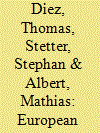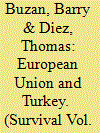|
|
|
Sort Order |
|
|
|
Items / Page
|
|
|
|
|
|
|
| Srl | Item |
| 1 |
ID:
073976


|
|
|
|
|
| Publication |
2006.
|
| Summary/Abstract |
Our article analyzes the impact of the European Union (EU) on border conflicts, in particular how integration and association are related to conflict transformation. We approach this issue from a theoretically as well as empirically grounded constructivist perspective. On this basis we propose a stage model of conflict development, based on the degree of securitization and societal reach of conflict communication. We argue that the EU can transform border conflicts and propose a four pathway-model of EU impact. This model comprises forms of EU impact that are, on the one hand, either actor-driven or indirectly caused by the integration process and have, on the other hand, as their main target either particular policies or the wider society in border conflict areas. We then apply this model to a comparative study of border conflicts, thereby analyzing the conflicts in Northern Ireland, Greece-Turkey, Cyprus, Europe's North (EU-Russia) and Israel-Palestine. We finish with a specification of the conditions of positive and negative EU impact.
|
|
|
|
|
|
|
|
|
|
|
|
|
|
|
|
| 2 |
ID:
065598


|
|
|
| 3 |
ID:
148236


|
|
|
|
|
| Summary/Abstract |
The promotion of regional integration is a core objective of the European Union’s (EU) foreign policy and has been seen as part of its attempt to transform international society and to make the world a more peaceful place to live. However, the success of this regionalization strategy has been limited and East Asia has been a particularly problematic case. This introduction raises some fundamental questions by first presenting some basic concepts so that the overall studies of the special issue can be systematically undertaken. The underlying questions are the following: How bleak is the picture with regard to regionalism in East Asia and the roles of the EU? Has the EU had no effect on the development of East Asian regionalism? And what potential does regional integration have in helping the transformation of conflicts in East Asia? In addition to these questions, it also discusses and conceptualizes underlying discourses on regional integration, conflict transformation, and regionalism in East Asia. By doing so, it aims to point out that the East Asia region is changing, the EU does play a role in this, and regionalization cannot be ignored as an institutional context that has the potential to assist conflict transformation, especially if windows of opportunity for such engagement arise in the future.
|
|
|
|
|
|
|
|
|
|
|
|
|
|
|
|
| 4 |
ID:
120736


|
|
|
|
|
| Publication |
2013.
|
| Summary/Abstract |
This article identifies four key problems in the debate about normative power Europe that may be fruitfully tackled when linking it to the concept of hegemony: the debate about whether EU foreign and external policy is driven by norms or interests; the problem of inconsistent behaviour as a result of competing and contested norms; the question of the role of state and non-state actors in EU foreign and external policy; and the problematic standing of normative power as an academic engagement, in particular in regard to whether the theory is of primarily explanatory, descriptive or normative value. The author suggests that the concept of hegemony may address these problems. First, it combines norms and interests, thus transcending the divide that has resulted in endless debates about the EU's standing as a normative power. Second, hegemony does not start from a pre-given set of norms with fixed meanings, but rather puts the struggles about these norms at centre stage, thus seeing inconsistencies not as undermining but as part and parcel of normative power. Third, hegemony expands our understanding of the actors involved in the construction and exercise of normative power, thus bringing not only Member States but also social forces in a much broader sense into the picture. Finally, hegemony reorientates the debate about normative power so as to reinstate the critical purpose that the concept was supposed to have from the start.
|
|
|
|
|
|
|
|
|
|
|
|
|
|
|
|
| 5 |
ID:
159351


|
|
|
|
|
| Summary/Abstract |
We live in an age of seemingly never-ending crisis. Financial markets are gripped by one convulsion after another, welfare systems are buckling under the strain of potentially unrealisable expectations, violent transnational non-state groups challenge state authorities and populist politicians and authoritarian leaders employing an old-fashioned nationalist rhetoric are on the rise across the world. The old order is clearly crumbling, but it is far from certain what sort of new one is waiting to be born. It is even less certain what role—if any—regional organisations and identities will play in it.
|
|
|
|
|
|
|
|
|
|
|
|
|
|
|
|
| 6 |
ID:
134253


|
|
|
|
|
| Summary/Abstract |
This article discusses the relevance of discourse in the analysis of EU foreign policy. Instead of using discourse as a structure, the discursive struggles in meaning production are emphasised. The article argues that the literature trying to make a contribution to the explanation of EU foreign policy has so far overemphasised the positive function of discourses in influencing policies in their substance. In contrast, the article focuses on the delimiting function of discourses in providing the boundaries of the kinds of policies which can be legitimately pursued. From this point of view, important discursive struggles take place exactly about these limits, and it is only through the setting of these limits that identities and norms are provided with clearer meanings. The article illustrates this framework by focusing on the debate about normative power Europe. It argues that an important aspect of this debate which has been missing from the literature so far is that it is indeed engaging in a struggle over what is acceptable as a policy of a normative power and is what not, and that it is therefore engaged in setting the limits of legitimate EU foreign policy.
|
|
|
|
|
|
|
|
|
|
|
|
|
|
|
|
| 7 |
ID:
060417


|
|
|
| 8 |
ID:
136220


|
|
|
|
|
| Summary/Abstract |
Climate change has been successfully represented as a security concern to such an extent that it is firmly established on the political agenda, even though the implementation of concrete policies is disputed. In this paper, we develop an analytical framework to better trace the process of securitising climate change and assess its normative implications. We establish a typology of six climate security discourses on the basis of two dimensions: three levels of referent objects and two logics of securitisation, one that corresponds to the original Copenhagen School framework and one where the threat takes the form of the invocation of risk. We find that there are significant differences in the relative importance of the resulting climate security discourses in Germany and the US, but that normatively, all discourses come with their own problems, which calls for more detailed scrutiny and assessment of climate security discourses and their political effects.
|
|
|
|
|
|
|
|
|
|
|
|
|
|
|
|
|
|
|
|
|